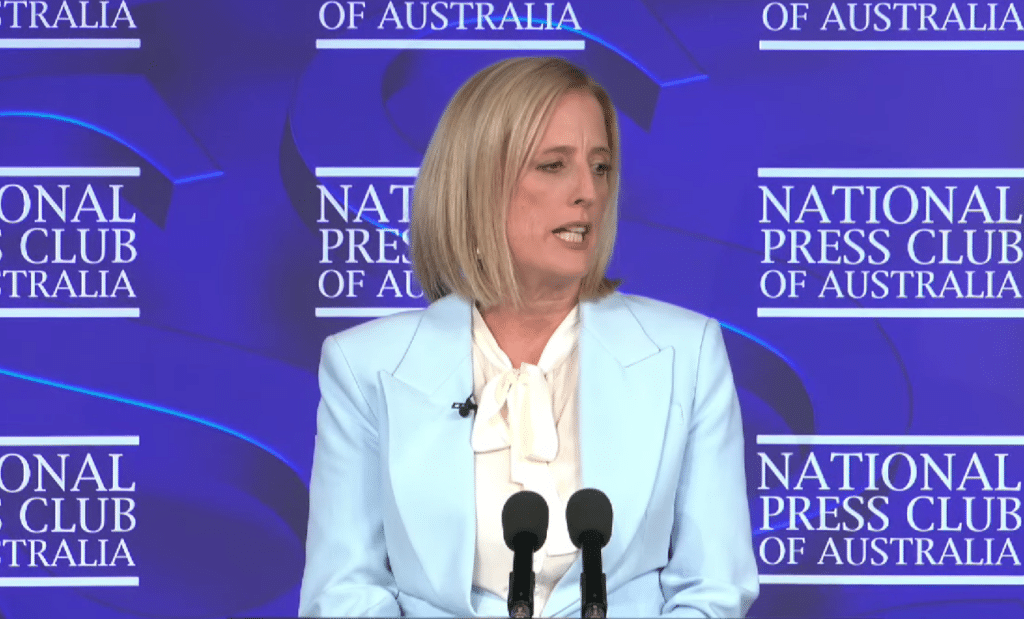Minister for Women Katy Gallagher has announced Australia’s first strategy for gender equality today, a 10-year commitment to drive action towards women’s equality.
At a speech at the National Press Club in Canberra, on the eve of International Women’s Day, Gallagher outlined what the strategy entails, as well as the details of the government’s new commitment to pay superannuation on paid parental leave.
“In 2024, women in this country, as a general rule, continue to be less safe, have less choice and be less economically secure than men,” she said. “And this is something that the Albanese Government is absolutely determined to change.”
Gallagher said that the same themes “keep coming up”: violence, unpaid and paid care, economic security, access to health services and leadership and representation. These are the five key areas that will be of focus in the gender equality strategy.
The strategy, called Working for Women, is designed to drive government action on women’s safety, sharing and valuing care, economic equality, women’s health, and women’s leadership, representation and decision making.
It is based on a stated vision of “an Australia where people are safe, treated with respect, have choices and have access to resources and equal outcomes no matter their gender”, and also responds to a consultation process with thousands of people and organisations.
“This inextricable link between gender equality and rigid expectations around care has been noted in many reports over the years including more recently by the Women’s Economic Equality Taskforce,” Gallagher said today at the National Press Club.
“The Taskforce, chaired by Sam Mostyn, found that if we abandoned prescriptive gender stereotypes, there would be significant economic benefits. And harnessing those economic benefits primarily relates to care. Who cares for whom, and why. Making care a choice, not a constraint. And making care something we value, make time for, are supported to do, and are recognised for.”
On paid parental leave, Gallagher said there’s no reason super shouldn’t be paid on this type of leave, just like annual and sick leave.
“The Government values the work that women do caring for children and we believe they shouldn’t be penalised with financial insecurity in retirement just because of those caring roles,” she said.
“Recent ATO data puts the gender super gap between 22 to 32 per cent. The decision today will not only help close the gender super gap, but it is also an important equity measure that will make a real difference for women.”
Gallagher also said that the gender equality strategy will make it a rule that, in order to win government work, businesses with 500 or more employees must commit to targets to improve gender equality in their workplaces.
“Every year, the government spends $70bn to procure goods and services and we think there’s more that can be done to make sure women are getting a fairer slice of that spending,” she said.
“These targets will focus on the gender makeup of their boards and the workforce; equal pay; flexible working arrangements; workplace consultation on gender equality; and efforts to prevent and address sexual harassment.
“Not only will businesses have to set targets, but they will also have to show progress towards them.”
Gallagher noted a number of initiatives the Albanese government has already implemented to improve gender equality, including changes to childcare, the expansion of paid parental leave, changes to the single parenting payment, adjustments to the stage three tax cuts, committing to the existing National Plan to End Violence against Women and Children 2022-2032, and amending the Fair Work Act to include 10 days of paid family and domestic violence leave, among other measures.
“I acknowledge that we don’t have all the answers. But we do have a mass of expert advice. And a lot of ideas worth pursuing,” Gallagher said.
“I’m determined not to waste this opportunity.”
You can find all the details of the government’s Working for Women strategy here.


